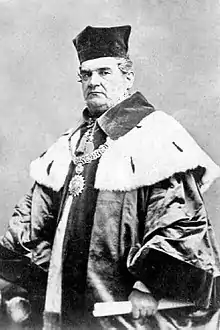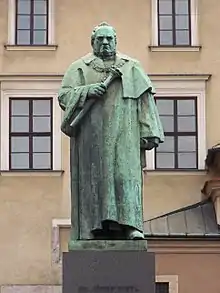Józef Dietl
Józef Dietl (24 January 1804 in Podbuże near Sambor – 18 January 1878 in Kraków) was an Austro-Polish physician born to an Austrian father and Polish mother. He studied medicine in Lviv and Vienna. He was a pioneer in balneology, and a professor of Jagiellonian University, elected as its rector in 1861. Dietl described the kidney ailment known as "Dietl’s Crisis" as well as its treatment.


He is renowned worldwide for being a "reformer of medicine" since he demonstrated through experiments that Bloodletting was useless if not dangerous.[1][2] His experiments were based on the use of a "control group", a procedure still used today in the so-called "clinical trials" foundation of Evidence-based medicine.[3]
From 1866 to 1874, Dietl was the mayor of Kraków.
References
- Zajaczkowski, T (2006). "[Joseph Dietl (1804-1878). Reformer of medicine and his contributions to urology]". Urologe A. 45 (1): 85–94. doi:10.1007/s00120-005-0955-9. PMID 16307223. S2CID 39745696.
- Adam Wrzosek, "Les mérites de Louis et de Dietl en ce qui concerne la suppression dans la thérapeutique de l'abus des saignées", Estratto dagli Atti dell'VIII Congresso Internazionale di Storia della Medicina, Roma 22-27 Settembre 1930, VIII Congresso Internationale di Storia della Medicina ( 22.08.1930-27.08.1930; Roma), Stab. V. Lischi e Figli, 1931
- Sven Ove Hansson, Why and for what are clinical trials the gold standard?, Scandinavian Journal of Public Health
- "Dietls crisis". Medcyclopaedia. GE. Archived from the original on 2012-02-07.
